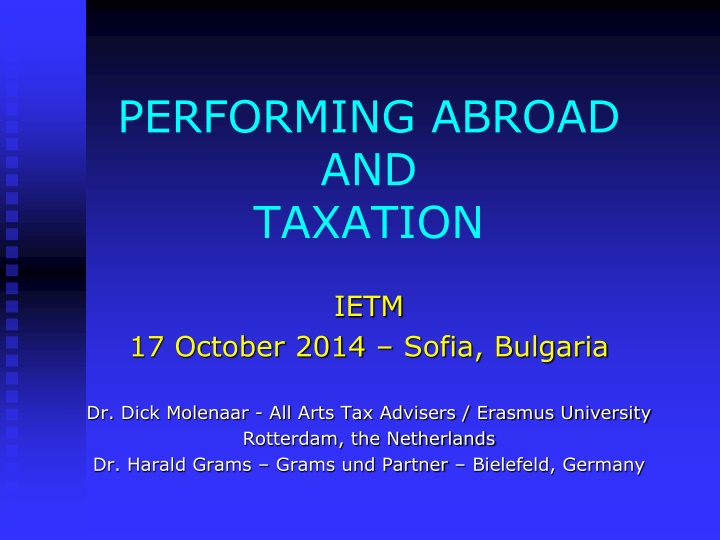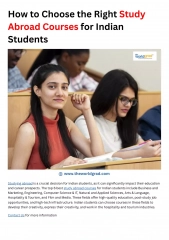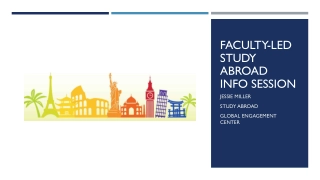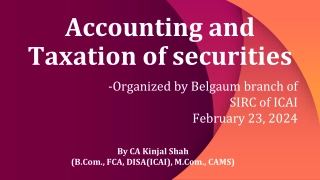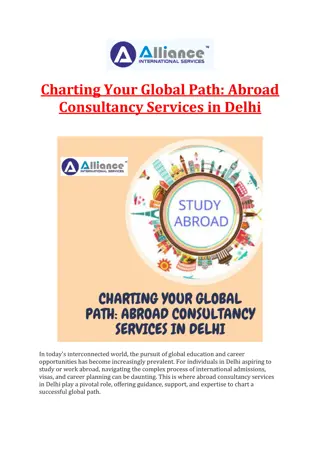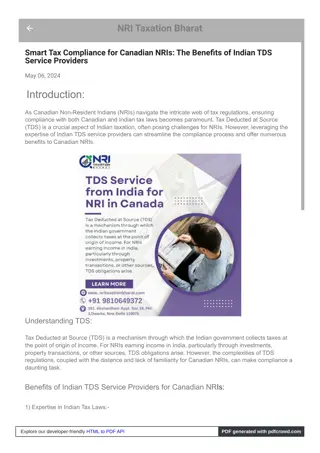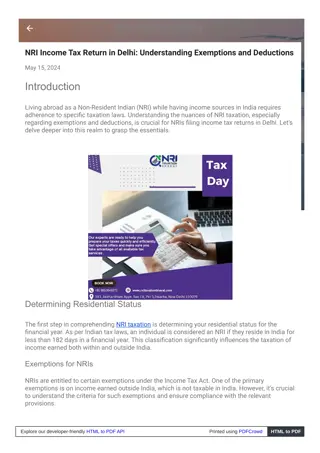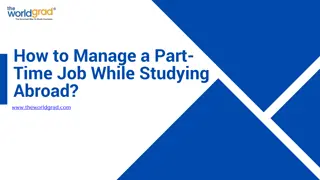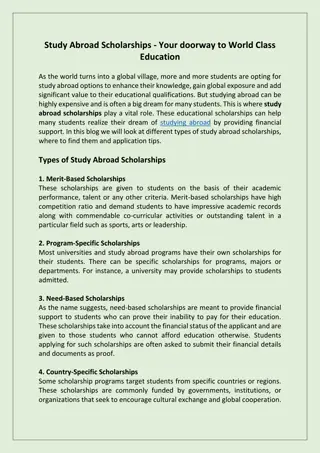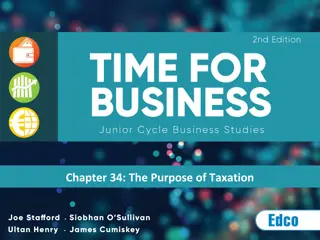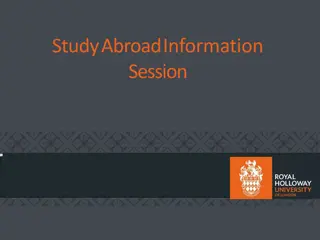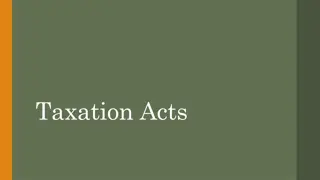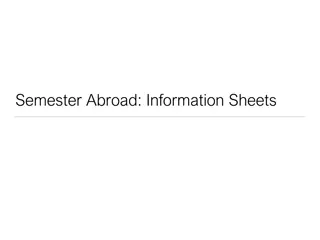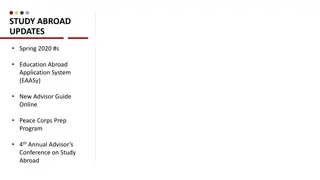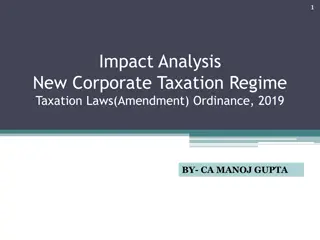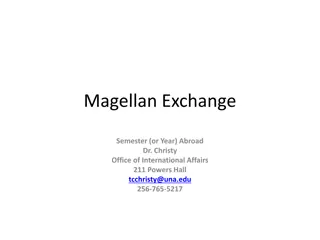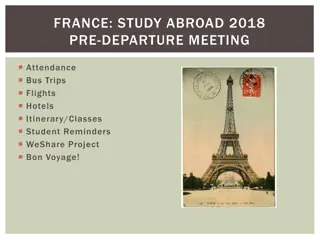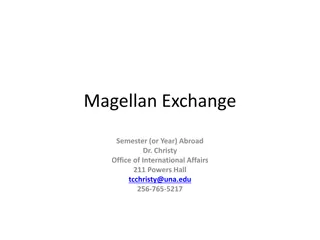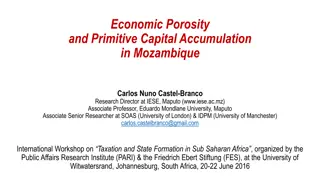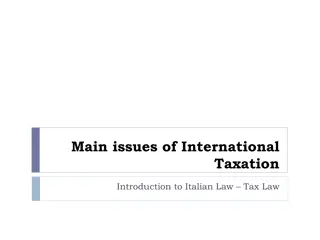Taxation Rules for Artistes and Sportsmen Abroad
Taxation rules for artistes and sportsmen performing abroad is crucial to avoiding double taxation and compliance issues. Explore the OECD Model's provisions, including Article 17, 15, and 23, and the 1987 OECD report's insights on tax avoidance strategies. Learn about the limited and unlimited approaches of Article 17(2) and the implications of no deduction of expenses for such income.
Download Presentation

Please find below an Image/Link to download the presentation.
The content on the website is provided AS IS for your information and personal use only. It may not be sold, licensed, or shared on other websites without obtaining consent from the author.If you encounter any issues during the download, it is possible that the publisher has removed the file from their server.
You are allowed to download the files provided on this website for personal or commercial use, subject to the condition that they are used lawfully. All files are the property of their respective owners.
The content on the website is provided AS IS for your information and personal use only. It may not be sold, licensed, or shared on other websites without obtaining consent from the author.
E N D
Presentation Transcript
PERFORMING ABROAD AND TAXATION IETM 17 October 2014 Sofia, Bulgaria Dr. Dick Molenaar - All Arts Tax Advisers / Erasmus University Rotterdam, the Netherlands Dr. Harald Grams Grams und Partner Bielefeld, Germany
SPECIAL RULES ARTISTES/SPORTSMEN Since 1963 in OECD Model: Art. 17 because of practical difficulties Art. 7 (+ 14) - Companies and self-employed: are taxed in country of residence, unless they have a permanent establishment in the country of work Art. 15 - Employees: are taxed in the country of work, unless The employer is based in the residence country The salary is paid in the residence country Less than 183 days in the country of work 2
PERFORMANCE INCOME Art. 17 OECD Model - Artistes and Sportsmen: Taxing right for the source country, overruling other treaty provisions Measure to counteract: tax avoidance non-compliance Art. 23 Elimination of double taxation with tax exemption or credit in the residence country 3
ARTICLE 17(2) Introduction in 1977 Also payments to others than the artiste or sportsmen fall under Art. 17 But limited approach, i.e. only in abusive situations Extended to the unlimited approach in 1992, after the 1987 OECD Report 4
1987 OECD REPORT Clear expression of mistrust ( 7 and 8): clear evidence of non-compliance rarely disclose casual earnings sophisticated tax avoidance schemes, many involving the use of tax havens, are frequently employed by top-ranking artistes and athletes relatively unsophisticated people in the business sense can be precipitated into great riches travel, entertainment and various forms of ostentation are inherent in the business and there is a tendency to be represented by adventurous but not very good accountants 5
NO DEDUCTION OF EXPENSES 94 of the 1987 OECD Report ( 10 of the OECD Commentary on Art. 17) The article says nothing about how the income concerned is to be computed. It is for a Contracting State s domestic law to determine the extent of any deductions for expenses. Domestic laws differ in this area, and some provide for taxation at source at an appropriate rate based on the gross amount paid to artistes and athletes. Such rules may also apply to income paid to groups or incorporated teams, troupes, etc. 6
PROBLEM OF EXCESSIVE TAXATION Insufficient tax credit in residence country, because of high withholding tax Example: 2.000 gross 1.200 expenses = 800 profit Withholding tax: 20% x 2.000 = - 400 Tax credit: 30% x 800 = 240 Insufficient tax credit = - 160 7
PROBLEMS WITH TAX CREDITS It is often problematic to achieve a tax credit in the country of residence. Examples are: No tax certificate available Name of group, but credit in name of artists Conflict with monthly salary administration No acceptance by local tax inspector This leads to international double taxation 8
OPTION: ARTICLE 17(3) OECD Commentary on Art. 17 gives the option for a tax exemption at source 14. Some countries may consider it appropriate to exclude from the scope of the Article events supported from public funds. Such countries are free to include a provision to achieve this but the exemptions should be based on clearly definable and objective criteria to ensure that they are given only where intended. Such a provision might read as follows: The provisions of paragraphs 1 and 2 shall not apply to income derived from activities performed in a Contracting State by artistes and sportsmen if the visit to that State is wholly or mainly supported by public funds of one or both of the Contracting States or political subdivisions or local authorities thereof. In such a case, the income is taxable only in the Contracting State in which the artiste or the sportsman is a resident. Very often used, e.g. in 44% of UK and 74% of German tax treaties 9
EUROPEAN UNION (ACHIEVED) No direct influence on artiste and sportsman taxation, but indirect through EU Treaty Gerritse: ECJ 12 June 2003, C-234/01 Scorpio: ECJ 3 Oct 2006, C-290/04 Entitled to deduction of expenses ! Normal tax rates Not yet in every EU country, such as Italy and Portugal But withholding tax is allowed after ECJ 18 Oct 2012, C- 498/10 (X NV (= Football club Feyenoord)) 11
ALEXEI OGRINTCHOUK http://i.telegraph.co.uk/multimedia/archive/01807/alexei-ogrintchouk_1807407b.jpg 12
THE NETHERLANDS - 2007 The government had decided not to tax non- resident artistes and sportsmen from treaty countries anymore 94 treaty countries Although the NL has the taxing right under Art. 17 of the treaty But tax revenue is too low and administrative expense are too high Return to normal taxing rights of Art. 7 and 15 15
EXEMPTIONS SPORTS EVENTS Winter Olympics Feb 2010 Vancouver Olympics Aug 2012 London Tax exemption for sportspersons The IOC uses this as a condition for the Olympics bid Clear sign that Art. 17 OECD is considered an obstacle Only effective with tax credit method in residence state Double non-taxation if tax exemption method applies Also 2011 ICC World Cup Cricket India / World Cup Rugby New Zealand Champions League Final 2011, 2012 and 2013 / EURO 2012 Poland + Ukraine Diamond League July 2013 London / Commonwealth Games 2014 Glasgow 16
2014 UPDATE OECD MODEL OECD has denied the proposal to delete Article 17 Options for exemptions and deductions in treaties: Limitation to business activities, exclude employees Deduction of expenses Minimum threshold of 15.000 per artiste per year Exemption for activities supported by public funds Exemption for teams, troupes and orchestras Exemption for Art. 17(2), when no participation in profits 1. 2. 3. 4. 5. 6. Technical changes for the Commentary on Article 17 17
PRACTICE National tax exemption in visiting country? If not, tax exemption possible under tax treaty? If not, deduction of expenses possible? If not, split contract between production and artiste fee? Minimum amount for individual artistes? If tax is withheld (or paid on top of net fee), ask for tax certificate Tax credits in residence country, for which foreign tax should be withheld from fees of individual artistes, because only they can apply for tax credits in their income tax returns Eliminate double taxation, also in case of net fees !! 18
